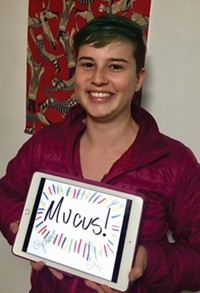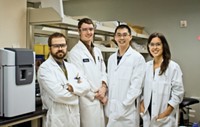Advertisement
Grab your lab coat. Let's get started
Welcome!
Welcome!
Create an account below to get 6 C&EN articles per month, receive newsletters and more - all free.
It seems this is your first time logging in online. Please enter the following information to continue.
As an ACS member you automatically get access to this site. All we need is few more details to create your reading experience.
Not you? Sign in with a different account.
Not you? Sign in with a different account.
ERROR 1
ERROR 1
ERROR 2
ERROR 2
ERROR 2
ERROR 2
ERROR 2
Password and Confirm password must match.
If you have an ACS member number, please enter it here so we can link this account to your membership. (optional)
ERROR 2
ACS values your privacy. By submitting your information, you are gaining access to C&EN and subscribing to our weekly newsletter. We use the information you provide to make your reading experience better, and we will never sell your data to third party members.
People
Novartis Postdoc Program Takes An Academic Track
Researchers gaining exposure to industrial science are encouraged to publish
by Rick Mullin
May 3, 2010
| A version of this story appeared in
Volume 88, Issue 18
The Novartis Institutes for Biomedical Research (NIBR) in Cambridge, Mass., leverages its proximity to Boston's academic community in several ways. One is through a postdoctoral research program that allows newly minted Ph.D. scientists to work in a commercial drug discovery organization but to publish their research as they would in the academic world.
The program is designed to help researchers compete in either industry or academia after their postdoc terms, says Leslie Pond, head of NIBR's postdoc program. "Postdocs here do basic research with the goal of publishing, which is one of the main measures of success in academic research," she says.
Traditionally, postdocs at large drug companies work on molecules in that company's pipeline, Pond explains. Much of the work involves patentable science, which restricts researchers' ability to publish. Although the benefit to the drug company is clear, the benefit to a researcher, who might eventually seek a position outside that company, is less so.
NIBR, which set up the postdoc track shortly after the organization was established in 2002, does not put postdocs on drug discovery project teams, Pond says. "They are not apprentices," she says. Instead, they are working to answer fundamental questions that could facilitate a better understanding of the science involved in drug discovery.
Of the 110 postdocs in the program, Pond says, 13 are chemists working in computer-aided drug design, synthetic organic chemistry, and analytical chemistry. The remainder of the postdocs in the program have degrees in biology, bioengineering, physics, and other areas.
"After my Ph.D., I wanted to work somewhere that I could remain close to the biologically relevant problems," says Paula Petrone, a physicist who recently completed her Ph.D. at Stanford University. The ideal position would be one where she could do valuable work in biophysics while gaining experience in an industrial drug discovery setting.
Yun Zhang, a chemist with a Ph.D. from Boston University, was looking for a similar experience for her postdoc work. Like Petrone, Zhang found a mix of academic and industrial science that she sees as an extension of her academic career. "Right now, I don't think it is a very dramatic change because I am still doing the same kind of research," she says.
Their advisers agree that keeping postdocs focused on basic science in proximity to commercial drug discovery is a win for both the postdocs and Novartis.
"Yun is evaluating flow technology," says Sejal Patel, a chemistry investigator working with Zhang at NIBR. "We want to look outside production applications to see how we can automate synthesis and have applications for flow technology for medicinal chemistry. What's in it for me as a Novartis employee is that I have an opportunity to keep in touch with academic research. We are also producing a technology that furthers our medicinal chemistry."
Lewis Whitehead, an investigator in NIBR's chemistry division, agrees that the postdoc program is ideal for keeping Novartis employees current in their scientific disciplines. "I am reminded that the name of this company means ‘new skills' in Latin—novae artes," he says. "Students like Paula and Yun bring in new skills that are state of the art in the academic environment."
Whitehead emphasizes the importance of keeping abreast of academic research in his field. "Someone like Paula can come in with expertise in RNA modeling or quantum mechanics that fertilizes my team with new programs and software that we are kind of not aware of," Whitehead says.
Having done a postdoc at Novartis 11 years ago and getting named in two patents in the process, Whitehead recognizes the traditional trade-off for scientists who might want to work in academia after doing postdocs in industry. "Ten years ago it was a huge risk," he says. "But Yun and Paula have written their own proposals. It was obvious from day one that they were thinking of publication and working on their skill sets."
He quips that he is somewhat jealous of the new breed of postdocs at Novartis. "I was working in East Hanover and Summit, N.J., miles from the nearest major academic research facility," Whitehead says. "Here, we only have to cross the road to get to MIT seminars."
Petrone, who is contemplating a career in academic research, perhaps in her native Argentina, says having a postdoc at a drug company rather than at one of the nearby universities might still look like a risk on paper. "But I don't feel like I'm taking a risk," she says. "I'm very happy."






Join the conversation
Contact the reporter
Submit a Letter to the Editor for publication
Engage with us on Twitter